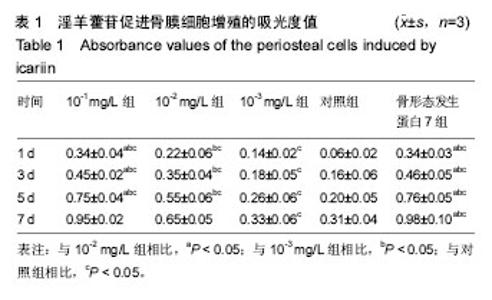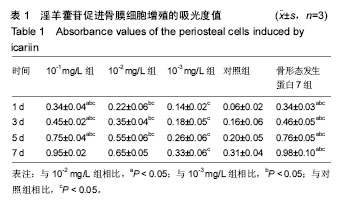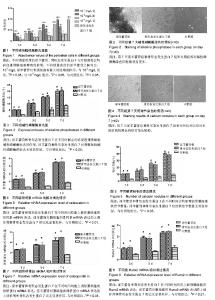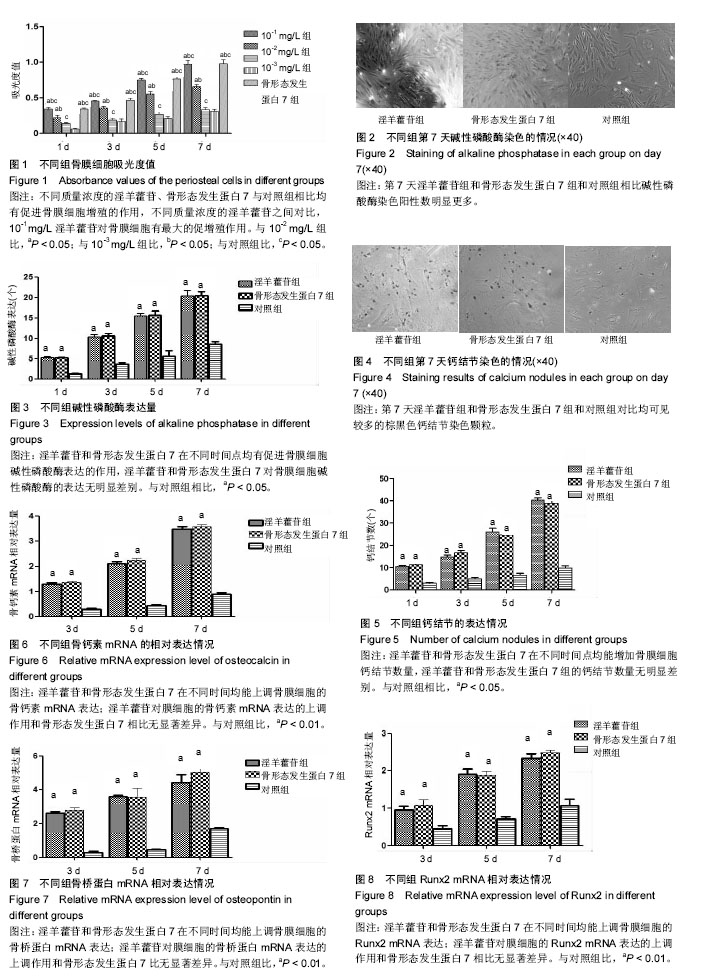| [1] 尤志强,林松青,王彬,等.淫羊藿苷抗骨质疏松症相关信号通路机制的研究进展[J].湖南中医杂志,2016,32(10):190-193.[2] 马婷,王丽娜,李子坚,等.淫羊藿苷抗肿瘤作用的研究进展[J].现代肿瘤医学,2017,25(9):1505-1508.[3] Wang PZ, Zhang FJ, He QL, et al.Flavonoid Compound Icariin Activates Hypoxia Inducible Factor-1α in Chondrocytes and Promotes Articular Cartilage Repair. PLoS One. 2016; 11(2):e0148372.[4] Wang QS, Zhang XC, Li RX, et al.A comparative study of mechanical strain, icariin and combination stimulations on improving osteoinductive potential via NF-kappaB activation in osteoblast-like cells.Biomed Eng Online. 2015; 14: 46.[5] 赵曙炎,马泽云.淫羊藿苷及其代谢产物脱水淫羊藿素促血管内皮细胞增殖的初步机制研究[J].黑龙江医学,2015,3:313-315.[6] 叶玉荷,胡芳华,邹佳萍,等.淫羊藿苷在体内外对血管生成的抑制作用[J].中国医学科学院学报,2015,37(3):264-268.[7] 唐菁,张玲,李翠玲,等.淫羊藿苷与黄芩苷联合多柔比星对肝癌细胞APRIL表达和血管内皮细胞生长抑制的研究[J].中华肿瘤防治杂志,2009,16(20):1534-1537. [8] Wang JH, Tao YX, Ping ZC, et al.Icariin attenuates titanium-particle inhibition of bone formation by activating the Wnt/β-catenin signaling pathway in vivo and in vitro.Sci Rep. 2016; 6: 23827.[9] Chi LQ, Gao WY, Shu XR, et al.A Natural Flavonoid Glucoside, Icariin, Regulates Th17 and Alleviates Rheumatoid Arthritis in a Murine Model.Mediators Inflamm. 2014; 2014: 392062.[10] Mok SK, Chen WF, Lai WP, et al. Icariin protects against bone loss induced by oestrogen deficiency and activates oestrogen receptor-dependent osteoblastic functions in UMR 106 cells. Br J Pharmacol. 2010; 159(4): 939–949. [11] Liu TL, Zhang X, Luo Y, et al. Slowly Delivered Icariin/ Allogeneic Bone Marrow-Derived Mesenchymal Stem Cells to Promote the Healing of Calvarial Critical-Size Bone Defects. Stem Cells Int. 2016; 2016: 1416047.[12] Liu M,Zeng X,Ma C,et al. Injectable hydrogels for cartilage and bone tissue engineering.Bone Res. 2017;5:17014.[13] Velasco MA, Narváez-Tovar CA, arzón-Alvarado DA. Design, Materials, and Mechanobiology of Biodegradable Scaffolds for Bone Tissue Engineering. Biomed Res Int. 2015; 2015: 729076.[14] Kim YK, Nakata H, Yamamoto M, et al.Osteogenic Potential of Mouse Periosteum-Derived Cells Sorted for CD90 In Vitro and In Vivo.Stem Cells Transl Med. 2016; 5(2): 227-234.[15] Chung JE, Park JN, Yun JW, et al. Cultured Human Periosteum-Derived Cells Can Differentiate into Osteoblasts in a Perioxisome Proliferator-Activated Receptor Gamma-Mediated Fashion via Bone Morphogenetic Protein signaling.Int J Med Sci. 2016;13(11): 806-818.[16] Sung IY, Park BC, Hah YC,et al. FOXO1 Is Involved in the Effects of Cigarette Smoke Extract on Osteoblastic Differentiation of Cultured Human Periosteum-derived Cells. Int J Med Sci. 2015; 12(11): 881-890.[17] Filion TM, Skelly JD, Huang M, et al. Impaired osteogenesis of T1DM bone marrow-derived stromal cells and periosteum-derived cells and their differential in-vitro responses to growth factor rescue. Stem Cell Res Ther. 2017; 8: 65.[18] Thitiset T, Damrongsakkul S, Bunaprasert T, et al. Development of Collagen/Demineralized Bone Powder Scaffolds and Periosteum-Derived Cells for Bone Tissue Engineering Application.Int J Mol Sci. 2013; 14(1): 2056-2071[19] 鲍远,黄俊明,靖兴志,等.淫羊藿苷促进骨髓间充质干细胞成骨分化[J].中国组织工程研究,2016,20(24): 3501-3507.[20] 杨志烈,王成龙,赵东峰,等.淫羊藿苷对环磷酰胺化疗导致小鼠骨髓间充质干细胞成骨分化障碍的保护作用[J]. 中国组织工程研究, 2016, 20(6): 777-784.[21] Bei K, Du Z, Xiong Y. BMP7 can promote osteogenic differentiation of human periosteal cells in vitro. Mol Biol Rep. 2012; 39(9):8845-8851.[22] Wu YQ, Cao LY, Xia LG, et al. Evaluation of Osteogenesis and Angiogenesis of Icariin in Local Controlled Release and Systemic Delivery for Calvarial Defect in Ovariectomized Rats.Sci Rep. 2017; 7: 5077.[23] Li XF, Xu H, Zhao YJ, et al. Icariin Augments Bone Formation and Reverses the Phenotypes of Osteoprotegerin-Deficient Mice through the Activation of Wnt/β-Catenin-BMP Signaling. Evid Based Complement Alternat Med. 2013; 2013: 652317.[24] 陶云霞.淫羊藿苷活化β-连环蛋白信号通路促进钛颗粒诱导的小鼠骨髓基质干细胞成骨分化[J].中华实验外科杂志,2016, 33(9):2179-2182.[25] 叶亚平,李娜,向威,等.周期性张应力联合淫羊藿苷促进脂肪干细胞成骨分化的实验研究[J].中华物理医学与康复杂志, 2017, 39(1):10-15.[26] 李霞,徐文漭,简洪,等.成纤维细胞生长因子1型受体-显性负性作用对骨髓基质干细胞成骨诱导培养后碱性磷酸酶活性的影响[J].中华创伤骨科杂志, 2016,18(6):526-531.[27] 汪琳,谷辉杰,陈晓,等.不同浓度SP600125对人脂肪干细胞体外增殖和成骨分化的影响[J].中华创伤骨科杂志, 2017,19(2): 157-163.[28] Wei JW, Shimazu J, Makinistoglu MP, et al. Glucose uptake and Runx2 synergize to orchestrate osteoblast differentiation and bone formation. Cell. 2015; 161(7): 1576-1591.[29] Kim HJ, Park JW, Lee KH, et al.Plant homeodomain finger protein 2 promotes bone formation by demethylating and activating Runx2 for osteoblast differentiation. Cell Res. 2014; 24(10): 1231–1249.[30] McGee-Lawrence ME, Carpio LR, Bradley EW, et al. Runx2 is required for early stages of endochondral bone formation but delays final stages of bone repair in Axin2-deficient mice. Bone. 2014; 66: 277-286.[31] Inglis S, Christensen D, Wilson D, et al. Human endothelial and foetal femur-derived stem cell co-cultures modulate osteogenesis and angiogenesis. Stem Cell Res Ther. 2016; 7: 13.[32] Watt J, Schlezinger JJ.Structurally-diverse, PPARγ-activating environmental toxicants induce adipogenesis and suppress osteogenesis in bone marrow mesenchymal stromal cells. Toxicology. 2015; 331: 66–77.[33] 贾亮亮,袁丁,王洪武,等.淫羊藿苷药理作用的研究进展[J]. 现代生物医学进展, 2010,10(20):3976-3979. |





